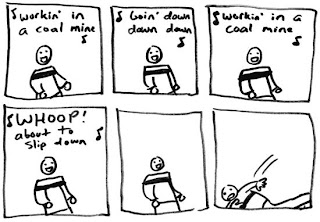Living to Work or Working to Live
 There’s a thread over on Two Plus Two that was begun six months ago and popped up again this week. Begins with a post provocatively titled “Poker sucks the life out of you” in which the OP makes several interesting points about what he believes to be poker’s negative effects on a person’s psychological well-being.
There’s a thread over on Two Plus Two that was begun six months ago and popped up again this week. Begins with a post provocatively titled “Poker sucks the life out of you” in which the OP makes several interesting points about what he believes to be poker’s negative effects on a person’s psychological well-being. As the post title suggests, he’s mostly critical of poker as a detrimental influence. After identifying himself as a losing player -- a detail that frankly derails most of the subsequent discussion -- he explains how even when he wins he can’t seem to enjoy himself, constantly asking himself “why, why, why am I doing this, especially when it can be so up and down?” He goes on to use words like “unfulfilled,” “unhappy,” and “empty” to describe his poker-playing experience. He understands and acknowledges the allure of money, but appears to have concluded that money isn’t enough to make poker worthwhile (for him). “The money is what keeps people around,” he says, “and without that, or if we realise there is more important things than money, the bottom falls out.”
Reading back over the post again yesterday, I was reminded of one of the Poker Grump’s “Poker Gems” from earlier this week, a quote from David “Viffer” Peat, a cash game pro who frequents the $50/$100 and $100/$200 no-limit hold’em games in Vegas.
The quote comes from the very end of an interview with Peat that appears in the latest issue of Card Player (the 20th anniversary issue). Peat mentions there how he’s discovered that for him the life of a poker pro is “not fulfilling,” yet he keeps at it, since “The money keeps me playing.” According to Peat, “Poker leads to a lonely life, and you never get a sense of accomplishment. The only fulfillment for a poker player is winning money, that’s it.”
Pretty grim stuff, and seemingly evidence strongly supporting the Two Plus Two poster’s thesis. Of course, the comments on Poker Grump’s post as well as many of those responding in the thread belie the notion that poker “sucks the life out of you.”
Whenever one encounters such pronouncements, one instinctively compares the views they express with one’s own experience. I’m a recreational player, and always will be. Even if I were to luckbox my way into some huge score, or if circumstances evolved to a point where I somehow managed to make more money playing poker than from any other endeavor, playing poker would never become a primary occupation for me. Thus, I cannot (nor will I ever) be able to address from a personal perspective the specific quandary faced by Peat and others, namely, the way poker can be unfulfilling for some of those who make it their primary job.
I can, however, relate to the idea of doing a job that is somehow less than rewarding, a job for which the “only fulfillment” is the relatively hollow one of earning a bit of cabbage. I think most of us can.
 I’m reminded of that much anthologized essay by Dorothy L. Sayers called “Living to Work” (written during WWII and first published in 1946). The British-born writer was best known for her terrific series of crime fiction novels, most written during the 20s and 30s and featuring the amateur detective Lord Peter Wimsey. She also translated Dante’s Divine Comedy.
I’m reminded of that much anthologized essay by Dorothy L. Sayers called “Living to Work” (written during WWII and first published in 1946). The British-born writer was best known for her terrific series of crime fiction novels, most written during the 20s and 30s and featuring the amateur detective Lord Peter Wimsey. She also translated Dante’s Divine Comedy. Sayers begins the essay by “dividing people into two main groups, according to the way they think about work.” The first group, “probably the larger and certainly the more discontented -- look upon work as a hateful necessity, whose only use is to make money for them.” These are the “working to live” folks who “feel that only when the day’s labour is over can they really begin to live and be themselves.”
The second group instead “look on their work as an oppportunity for enjoyment and self-fulfilment.” These are the lucky ones who “only want to make money so they may be free to devote themselves more single-mindedly to their work.” They are “living to work.”
She goes on to analyze each group in greater detail, making the important point that while we might find discover certain types of employment producing more members of one or the other group (e.g., artists and scholars may well be more likely to “live to work”), what we’re really talking about here is a “fundamental difference of outlook” that doesn’t necessarily depend on the type of job one has. That is to say, anyone can potentially land in either group depending on a variety of circumstances, some externally-produced and some coming from within.
As you might imagine, Sayers doesn’t list “professional poker player” as one of the job types under examination and so doesn’t offer any opinions about whether the poker pro is more likely to “work to live” or “live to work.” It would be an interesting question to consider, I think, given the special, direct significance money has to the poker pro as an unambiguous measure of “success.”
So which group do you belong to? And where does poker fit into your ideas of work and leisure?
Labels: *shots in the dark, David Peat, Dorothy Sayers














4 Comments:
A few days ago I was thinking about something along these lines and blogged about it. I play poker with hopes of becoming a winning player to the extent of making it a substantial side income (side income, because I will not give up IT, it's just too awesome a job).
Yet, strange as it may sound, money is not the driver. Winning money would enable me to play at higher levels, employing different strategies. Right now I play pot limit Omaha according to the Slotboom short-stack method. A well-executed hand, or even a well-played session brings my a sort of intellectual joy. Being able to assess the table correctly and putting everything into place for those few hands in which I get heads up, with dead money to make my pre-flop all-in correct, where the strategy to be all-in pre-flop and have the remaining players push each other out of the pot works and where I compensate paying the blinds by picking up a small pot uncontested because of my very tight image - if that all works, I feel good, no matter if I lost or won. In the long run, I want to win because it is a measure of my effectiveness.
Also, if I'm able to show patience in the face of the inevitable unhelpful river, that is part of it too.
This is why I play poker and why winning is both important and a secondary goal.
I'm more of a recreational player but do get those occasional thoughts of how sweet it would be to be a pro after I have a good session. However, I know that professional poker can't exactly be the life since most of those guys are making prop bets on the side because they get so bored.
I've googled around a bit and can't find a good source for Dorothy Sayers' essay. I'd love to have a closer look - can you point me in a good direction?
I think you can find yourself in either category at various times of your life. I was once a 'live to work' person and now I find myself squarely in the 'work to live' camp. As I've gotten older and taken on more responsibilities (mortgage, family, kid, etc.) my priorities have changed. I no longer want to spend 50-60 hours working as I'd like to also spend some quality time with my family. As I lost focus on work/career, suddenly a wide variety of other topics started sounding more interesting. meh. such is life. ebbs and flows and always changing. Perhaps someday I'll live to work again.
dfdugal -- I also haven't seen the Sayers essay online. I know it has been anthologized in a few places, including the Dolphin Reader (6th ed., I think).
Post a Comment
<< Home